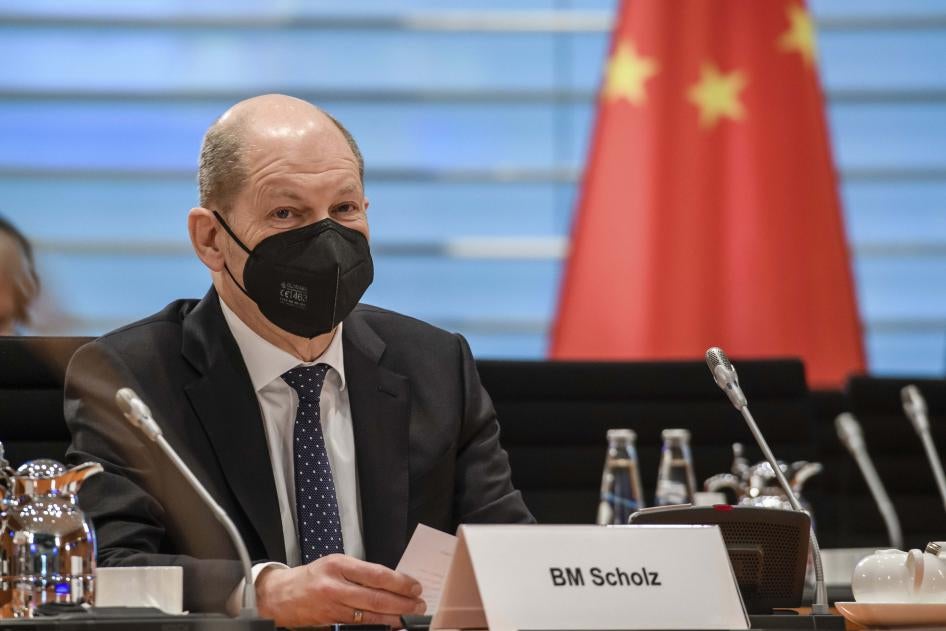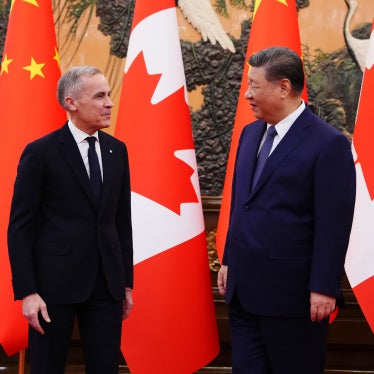In early November, German Chancellor Olaf Scholz will meet in China with Xi Jinping, who has just awarded himself a third term as leader of the Chinese Communist Party. Scholz will be the first democratic leader to make such a visit since the 20th Party Congress and the beginning of the Covid-19 pandemic—and since the United Nations human rights chief reported that Xi’s government committed possible crimes against humanity in Xinjiang.
Scholz, Foreign Minister Annalena Baerbock, and other senior officials have indicated that their government will take a tougher position in their bilateral relationship with the Chinese government, and suggested that Berlin’s new China strategy will place greater emphasis on values and human rights. The government has been carrying out Germany’s supply chain due diligence legislation, and is involved in debates for more robust European Union regulations preventing and responding to human rights and environmental harms in supply chains, including forced labor.
In early October, Germany supported an initiative at the United Nations Human Rights Council supporting debate about UN’s Xinjiang report. And just days ago Baerbock reflected concerns about Chinese investment in the Port of Hamburg: “With every investment in German critical infrastructure, we have to ask ourselves what this could mean at the moment when China would oppose us as a democracy and community of values.”
The Chancellor’s visit—in this profoundly different diplomatic and political era—should throw into stark public relief the extent to which Germany’s China policy reflects a genuinely different approach. He and other German leaders can take three steps to clarify their strategy.
Ahead of the visit, Scholz and Baerbock can demonstrate their commitment to a new era by meeting in Berlin with those whose interests are acute: victims and survivors of Chinese government human rights violations, including those with family members still in China. German leaders shouldn’t just ask for and factor in those people’s views about the new strategy and priorities for the visit. They should also compile lists of German citizens’ and permanent residents’ family members missing, forcibly disappeared, or wrongfully detained in China, and specifically ask Xi for their freedom. The delegation should also make itself available to meet with independent activists in China.
German officials indicate they intend to prioritize in discussions with Xi the threats to the international rules-based order. While this primarily refers to China’s support of Russia’s invasion of Ukraine, it should also include the Chinese government’s hostility to the international human rights system. Scholz should inform Xi that Germany will press ahead with steps toward a Human Rights Council-backed investigation into Beijing’s crimes against humanity targeting Uyghurs and other Turkic communities, and that German judicial officials could open preliminary investigations into crimes against humanity in China. He should also publicly call on Xi to end his relentless repression of peaceful activists across China, pervasive abuses in Tibet and Hong Kong, and the government’s efforts to undermine the UN human rights system.
German businesses will play a prominent role in the visit. Foreign firms have been caught in the crosshairs of Chinese government-stoked nationalist ire, in some cases because they expressed public concern for human rights violations in China. Credible reports of forced labor in Xinjiang and in other parts of the country, and state actors’ economic complicity in violations, have prompted new legislation and sanctions on commercial activity. In Hong Kong, the draconian National Security Law and other assaults on human rights create new risks for commercial enterprises.
Companies accompanying Scholz on the delegation should make statements beforehand about their concern for human rights in China, their efforts to address potential supply chain connections to forced labor--and how they will use the trip to advance those efforts.
In late May, the German Federal Foreign Office criticized Chinese authorities for restricting the visit of then-UN High Commissioner for Human Rights Michelle Bachelet, stating that, “Human rights are not an internal matter of states.” Scholz and other senior German officials are no doubt under pressure from the Chinese government to downplay human rights in this first post-Party Congress visit—a standard to which Beijing will try to hold other democracies. This is all the more reason for Scholz to demonstrate his government’s new path as he touches down in Beijing.









